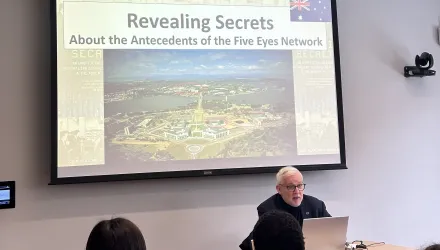By Eric Brattberg and Philippe Le Corre
Washington and Brussels don’t completely agree on how to respond to China’s resurgence in the Indo-Pacific, but they both want to preserve the international order, leaving some room for more cooperation
EXECUTIVE SUMMARY
The evolving strategic dynamics in the Indo-Pacific are of paramount importance for the future of the rules-based international order. While the United States is redirecting strategic focus to the region as part of its Free and Open Indo-Pacific strategy, Europe is also stepping up its role—leveraging a strong economic profile, long-standing bilateral ties, and active engagement in various regional multilateral forums. The European Union (EU) and its member states can make distinct contributions to an open, transparent, inclusive, and rules-based regional order, though not necessarily always in lockstep with Washington.
Though few European countries have formally acknowledged the new U.S. strategy, the concept’s emphasis on rules-based order and multilateralism bears many similarities to the EU’s own outlook. The EU and many of its member states are becoming more ambivalent about Chinese power and are seeking to counter certain problematic Chinese economic behaviors, and the Indo-Pacific offers opportunities for transatlantic cooperation, though U.S.-EU diplomatic relations under U.S. President Donald Trump are significantly strained. However, the U.S. administration’s fixation on short-term transactional diplomacy, lack of commitment to multilateralism, and strong emphasis on Chinese containment are putting a damper on such collaboration with EU members.
Admittedly, Europe does not aspire to be a traditional hard power in Asia, lacks significant military capabilities in the region, and is reluctant to pick sides in the escalating U.S.-China competition. Only two European middle powers—France and the United Kingdom (UK)—can project serious military force in the region, as Europe has long underinvested in defense spending and needs to prioritize more immediate security threats. But Europe can amplify its political and security role in the Indo-Pacific by leveraging the growing Franco-British presence and better utilizing the EU’s collective role. Key European countries have already expanded their security footprint in the Indo-Pacific through a more regular naval presence, bilateral and multilateral joint exercises, arms sales, and various other forms of defense cooperation. Europe’s economic role is already considerable too, as the EU is a top trade and investment partner of most regional states.
Washington should welcome greater European involvement in the Indo-Pacific. A greater European presence in the region advances the U.S. objective of promoting a tighter regional security architecture with vital partners like Japan and India. Similarly, the EU’s support for the Association of Southeast Asian Nations (ASEAN) can help foster a more multilateral, cooperative Asian security architecture. As for economic and trade policy, U.S. and EU interests in the region largely overlap but do diverge in significant ways. While both Europe and the United States are keen on increasing trade flows and addressing unfair Chinese economic practices, the EU’s emphasis on free trade has allowed it to either complete trade agreements or launch new negotiations with regional partners like Australia, Japan, and Singapore.
Despite the limitations constraining the transatlantic diplomatic agenda, meaningful joint and/or complementary European and U.S. action in the Indo-Pacific remains achievable, particularly between France, the UK, and the United States, though other European countries and the EU could get involved too. While the EU is not likely to formally endorse the U.S. slogan of a Free and Open Indo-Pacific, Europeans can still meaningfully advance its objectives, which are overwhelmingly consistent with the EU’s own interests and values. Washington should encourage this trend and simultaneously seek to do more to incorporate European players as key partners on the implementation of its own Free and Open Indo-Pacific strategy.
RECOMMENDATIONS FOR EUROPE:
- Enhance Europe’s strategic thinking on the Indo-Pacific
- Build a European consensus on China
- Invest in regional multilateralism
- Double down on nontraditional forms of security assistance
- Identify other ways to contribute to maritime security
- Leverage defense exports to the region
- Invest in regional connectivity
RECOMMENDATIONS FOR WASHINGTON:
- Enhance transatlantic strategic dialogue on the Indo-Pacific
- Keep political messaging in sync
- Clearly convey the U.S. Indo-Pacific strategy to European partners
- Acknowledge the EU’s unique complementary role in regional security affairs
- Avoid taking swipes at the EU
- Encourage greater European multilateral participation
- Boost direct transatlantic security cooperation where possible
- Discuss connectivity in the Indo-Pacific more
- Enhance dialogue on export controls and FDI screening
Le Corre, Philippe. “The Case for Transatlantic Cooperation in the Indo-Pacific.” December 18, 2019
The full text of this publication is available in the link below.




